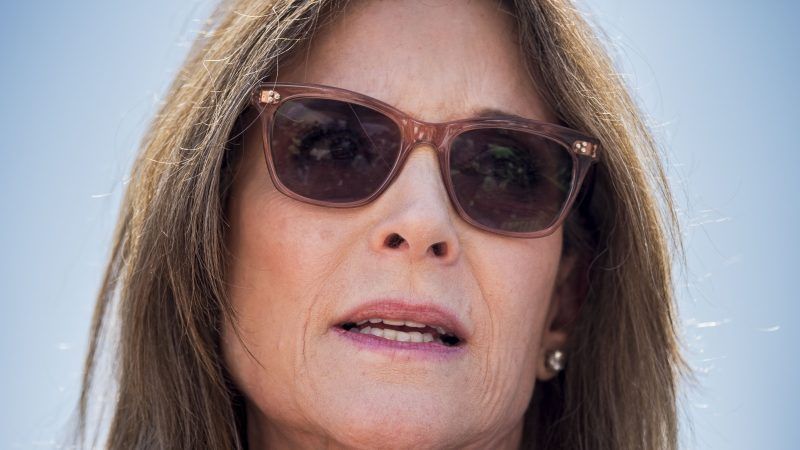Marianne Williamson Wants To Defeat Dark Psychic Forces With New Department of Peace
True to form, the presidential hopeful is turning the conversation around war on its head.

Never before has there been a presidential candidate quite like Marianne Williamson, the Democratic hopeful and purveyor of healing crystals who wants to combat the "dark psychic force" shrouding the White House. But that battle can't be fought in typical fashion, she says. Instead, she suggests that the country create a Department of Peace.
The approach is Williamson's modus operandi, which consists of taking established political norms and turning them topsy-turvy. We don't have a health care system, we have a sickness care system. We cannot just suppress violence, we also need to create nonviolence. We should not wage war, but instead, we must wage peace.
Williamson correctly acknowledges the pitfalls of our current attitude toward defense. "We spend more on our military than the next nine largest militaries in the world," the plan explains. "As has become evident in Afghanistan, Iraq and Syria, as well as against terrorist enemies like ISIS, at best our military can solve part of the issue, leaving the true, underlying problems unaddressed."
And the way to do that, she says, is to deploy global peace-building support and humanitarian aid resources—food, health care, education, and more—to assist countries in ending conflict.
It's an attractive idea, and parts may even be prudent in countries where U.S. military intervention has contributed to community decay. Take Afghanistan, for instance, where decades of conflict have left many without access to food and water. But would Williamson's plan make a difference?
Probably not.
That our modern-day mindset toward the military has been a failure is largely wrapped up in the regime change wars we've waged. Such endeavors are doomed, most notably because the U.S. does not (and cannot) know the cultural underpinnings of every foreign nation. Why would peace-building be any different?
A 15-year study by Susanna P. Campbell, an assistant professor at the School of International Service of American University, hits at the heart of that very query. After spending time in Burundi, Democratic Republic of the Congo, Nepal, South Sudan, and Sudan, she concludes that international attempts at peace-building fail to produce the desired results, as those efforts are inherently accountable to foreign entities, not the local communities where the work takes place.
Aid workers on the ground—who, in Williamson's plan, would be accountable to the U.S. government—are working to fulfill the demands of faraway stakeholders without fully integrating into the cultural landscape. Success is often measured in how much money workers spend out of the allotted project funds.
"People focus on spending. They have so much to spend and so little time," one international aid worker in South Sudan told Campbell. "People spend 40 percent of their time talking about their burn rate [the rate at which they spend allocated funds]." Campbell suggests a local approach, where international aid groups must answer to communities—not the other way around. Such a model would be fantasy if taxpayers were funneling billions of dollars into the Department of Peace.
Williamson also proposes a broad domestic plan that is conspicuously light on specifics. If president, the spiritual guru would "effectively treat and dismantle gang psychology," "rehabilitate the prison population," and "address factors such as drug and alcohol abuse, mistreatment of the elderly, and much more." Okay, but how?
Part of that would be accomplished with her Peace Academy, she says, a four-year institution to complement U.S. military academies. Graduates will serve at least five years in public service, where they will work toward violence prevention, either domestically or abroad.
It's hard to argue with warm and fuzzy ideas like "violence prevention" and "conflict resolution," which Williamson says she would like to see taught in schools. True to her campaign, the presidential hopeful has taken the conventional conversation and flipped it on its head, making us question why things really are the way they are. But a Department of Peace is unlikely to meaningfully reduce our aimless military pursuits and bloated defense spending—let alone the alcoholism and gang violence Williamson also hopes to fix.
